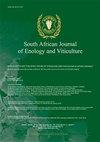葡萄串腐病的酒庄现场评估:追求可持续实践:葡萄串腐病的酒庄现场评估
IF 1.1
4区 农林科学
Q4 FOOD SCIENCE & TECHNOLOGY
引用次数: 0
摘要
酿酒厂负责加工南非每年75%的酿酒葡萄产量。生产商酒厂的特点是加工大量的酿酒葡萄,因此在葡萄质量上有很大的变化,其中包括葡萄串腐烂的存在。葡萄串腐对葡萄和葡萄酒的品质有害。这篇综述从作者介绍生产商酒厂的工业情况的背景开始。接下来的一节是关于腐烂感染对葡萄酒生产的经济影响。本文讨论了葡萄腐烂病不可避免地成为葡萄生产一部分的两个主要原因。生产商酒厂在准确的腐烂评估方面面临的挑战。最后一部分的审查侧重于寻求可持续评估葡萄串腐病在工业条件下。红外光谱(IR)技术可为葡萄酒厂现场腐烂病的客观评估提供可持续的选择。然而,即使有了大量的光谱方法,以及红外光谱快速评估葡萄束腐病的潜力,这些方法仍未在工业条件下常规应用。本文章由计算机程序翻译,如有差异,请以英文原文为准。
Winery on-site assessment of grapevine bunch rot: In pursuit of sustainable practices: Winery On-site Assessment of Grapevine Bunch Rot
Producer wineries are responsible for the processing of 75% of South Africa’s annual wine grape production. Characteristic to producer wineries is the processing of large volumes of wine grapes, thus incorporating enormous variability in grape quality, which include the presence of grapevine bunch rots. Grapevine bunch rots are detrimental to grape and wine quality. This review begins with the authors bringing background on the industrial situation at producer wineries. A section follows where the economic effect of rot infection on wine production is written about. Two principal reasons why rot infections are inevitably part of grape production are discussed. Challenges for producer wineries in terms of accurate rot assessment is set out. The last part of the review focusses on the quest for sustainable assessment of grapevine bunch rot infections under industrial conditions. Infrared spectroscopy (IR) could provide a sustainable option for objective assessment of rot infection on-site at producer wineries. However, even with the availability of plenty of spectroscopic methods, as well as demonstrated potential of IR spectroscopy for rapid assessment of grapevine bunch rot infections, these methods are yet to be applied routinely under industrial conditions.
求助全文
通过发布文献求助,成功后即可免费获取论文全文。
去求助
来源期刊
CiteScore
2.50
自引率
7.70%
发文量
1
审稿时长
>36 weeks
期刊介绍:
The South African Journal of Enology and Viticulture (SAJEV) publishes full-length original Research Papers, Research Notes and Review Papers on all subjects related to enology and viticulture. The SAJEV does not accept articles published in, or submitted to, other journals.

 求助内容:
求助内容: 应助结果提醒方式:
应助结果提醒方式:


